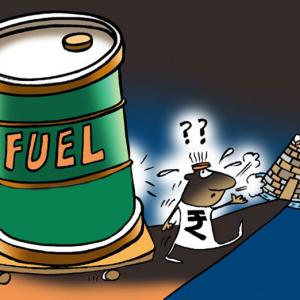India expects to remain unscathed this time, mainly because it is in a sweet spot as the world’s third largest oil consumer, after the US and China, says Subhomoy Bhattacharjee.

The broad smiles on the face of those present at the inauguration of Saudi Arabia’s state-owned oil company Aramco’s new office in Gurugram in October this year were for real.
The massive purge within the Saudi royal family, Aramco’s owners, hadn’t begun.
A month later, Crown Prince Mohammed bin Salman struck: more than 200 Saudi citizens were arrested, including 11 princes, on corruption charges.
Is the world heading for another oil shock?
The putsch certainly pumped up prices immediately.
A disruption unprecedented in the history of the world’s largest oil producer had the potential to be deeply damaging for India, which imports 81 per cent of its crude requirements, of which Aramco is the second largest supplier.
Yet India expects to remain unscathed this time, mainly because it is in a sweet spot as the world’s third largest oil consumer, after the US and China.
“We are sitting pretty,” said a top Indian government oil ministry official.
That the power struggle has come just months ahead of Aramco’s forthcoming public issue, in which - significantly - China too plans to invest, doesn’t alter India’s oil policy either.
Why not? In the seventies, India was a bit player in the crude market, with little say in prices.
Now, India’s share of the global energy use has not only reached 5.5 per cent ( as of 2016), it is the fastest growing among all countries, notes BP Statistical Review, 2017.
By 2035, that share could reach double figures.
Basically, India will add another India to its current consumption in 20 years.
China accounts for 23 per cent today and will be adding a bit more to reach 25 per cent.
On Tuesday, as the International Energy Agency releases its annual World Economic Outlook, those numbers could look even more skewed in favour of India.
To feed the economy on such a massive scale, India needs political stability among its oil partners to ensure they supply the energy barrels steadily.
This is exactly what the president and CEO of Aramco, Amin H Nasser, has promised at the opening of his company’s India office (an upgrade from its 2010 office).
“We are here to meet India’s future energy demands by offering a strong relationship involving secure and reliable supply of energy feedstock to fuel India’s dynamic growth,” he said, albeit before his country’s ruling family imploded.
Delhi will be Aramco Asia’s fifth office in the continent.
The subsidiary of Saudi Aramco, located in Singapore has offices in China, Japan, South Korea and Indonesia.
The parent company’s presence in Europe is secured through another arm, Aramco Overseas.
This vehicle had established an India office in 2010. These offices are an expression of faith by the world’s largest oil company in the major importing countries’ fuel supply chains.
Aramco also plans to raise $100 billion through it when it lists in January 2018.
China is now more likely to make its purchases from the secondary market rather than the primary market.
An investment in the Saudi company by India at this stage would mean New Delhi is sanguine about how the developments in Riyadh will pan out.
But oil ministry mandarins are clear that, despite the talks of Chinese investment in Aramco, there is little possibility of India investing in the issue.
It is not that India does not invest in oil equity abroad.
It does so in two ways. One of them is through “equity oil,” where India invests in the equity of an oil field, as it has done in Venezuela or Sakhalin in Russia.
It offers a share in the oil drilled from the ground to be either imported to India or sold abroad.
The second format is equity in the mother company, like that of Rosneft.
Over the years, India has cumulatively invested in both streams (public and private sector) about $30 billion.
“None of our investments abroad has got us oil back home, though we have made profits”, said the official.
Yet the reason India is comfortable now is the size of its domestic market.
The kingdom is now the largest crude oil supplier to India after Iraq.
India sourced 19 per cent of its oil imports and 29 per cent of LPG imports from Arabia in 2016-17, totalling about 39.5 million tonnes.
Iraq owed its rise as the top seller to India in the past few years because India’s traditional partner, Iran, ran into sanctions.
Since the volatile 1970s when the two oil shocks nearly crippled India, New Delhi has invested in building refineries configured to Iran’s heavier crude instead of Saudi Arabia’s predominant sweet oil.
Not that India is starved of refining capacity to handle both. The country with 23 refineries is the fourth largest refiner of oil, with only the US, China and Russia ahead of it.
In the current financial year, Iran had briefly reclaimed its position at the top in India’s import table.
Private-sector Reliance Industries and state-run Mangalore Refineries have bought large consignments from it.
The change in the pecking order is significant as it comes just ahead of the meeting of the price setting body, Organization of the Petroleum Exporting Countries, on November 30.
On the agenda is a planned production cut among the member countries after the present commitments expire in March 2018, which will prop up prices by wiping out excess inventory from the global markets.
For India, therefore, the political putsch in Riyadh is seen as an even better reason to maintain the diversity in the supply base.
The first of its kind import from the US, for instance, is designed to send out just such a political message.
There could be additional benefits too. A Reuters report said Aramco plans to buy into one of India’s refineries on the west coast.
The reasons are clear. Those investments can lock in demand for its crude and expand its market share. Those plans, despite the turmoil back home, are on course.
Also, Saudi support to India has come with more intelligence-sharing between the two countries.
Indian oil minister Dharmendra Pradhan certainly had reasons to smile broadly at Aramco’s inaugural function.
Photograph: Carlos Garcia Rawlins/Reuters










